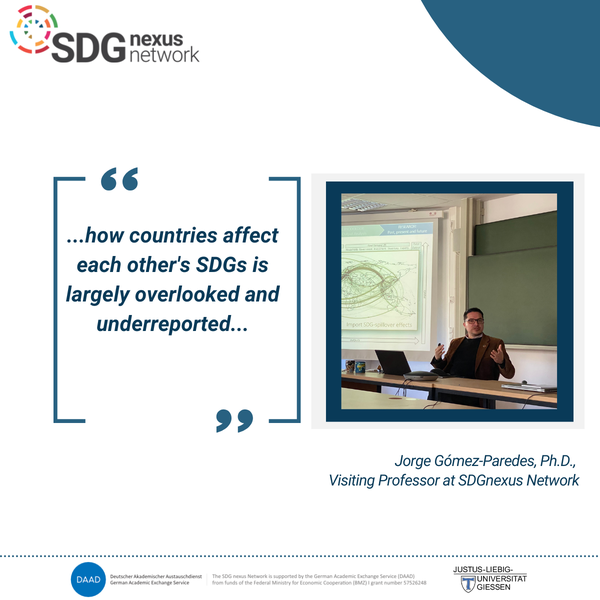13.02.2023 - Application of Input-Output model to assess SDG-Spillover effects
Jorge Gómez-Paredes, Visiting Professor at SDGnexus Network, presented the application of Input-Output macroeconomic models to assess SDG-Spillover effects on 8 February at the ZEU Colloquium.
Dr. Gómez-Paredes highlighted that half of the 15-year implementation period of Agenda 2030 has passed, and with only seven years left, several challenges need to be addressed for any significant progress toward the SDGs to materialize. One of those challenges, largely overlooked, is to understand and monitor countries’ “spillover effects” regarding the SDGs, namely, how countries affect one another in their SDGs achievements. Dr. Gómez-Paredes proposed a definition and characterization of SDG-related spillover effects and the application of Multi-Regional Input-Output (MRIO) models to assess import-related SDG-spillovers systematically and comprehensively. This approach is based on the integration (“extension”) of MRIO models with data compatible with some of the 232 indicators of the global indicator framework proposed by the UN Statistical Commission’s Inter-Agency and Expert Group on Sustainable Development Goal Indicators (IAEG-SDG).
He also presented preliminary results from a recent study conducted with colleagues about soybean commodities produced in Argentina and consumed globally and how such global value chains tele-connect SDGs across countries. Results portrayed positive and negative effects on the SDGs of Argentina (e.g., those related to employment -SDG 8- and eutrophication risk -SDG 14-) driven by global consumption of soybean commodities. This study will soon be submitted to an academic journal for publication.
Questions and answers about the concept of spillover effects in the context of the SDGs, challenges in data collection and analysis, and implications for the current SDG performance ranking followed after the presentation at the ZEU Colloquium.
Dr. Gómez-Paredes teaches an introductory course on sustainable development from the perspective of complex systems in the Master Degree Programme Sustainable Transition. His research focuses on ecological economics, industrial ecology, and political ecology, with a particular interest in understanding economic spillover effects in the context of complex social-ecological systems, analyzing and assessing sustainable consumption and production along the global value chain (via Input-Output & Life-Cycle Assessments).

